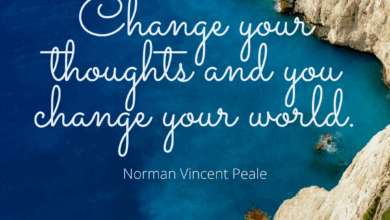The Hidden Lesson in Projection: It’s Never Really About Us


Want more posts like this in your life? Join the Tiny Buddha list for daily or weekly insights.
“What others say and do is a projection of their own reality, their own dream. When you are immune to the opinions and actions of others, you won’t be the victim of needless suffering.” ~Don Miguel Ruiz
For most of my life, I didn’t fully understand what projection was. I just knew I kept becoming the problem.
I was “too much.” Too intense. Too emotional. Thought too deeply. Spoke too plainly.
Again and again, I was blamed, misunderstood, and cast out for holding up a mirror to things no one wanted to see.
But in my forties, I began doing shadow work in and out of therapy. At first, I thought the shadow was the broken part. The mess to fix. The thing to hide.
But I slowly realized: the shadow is where the gold lives. It’s the part of us we disown—but it’s also the most authentic expression of who we really are.
As a little girl, I was naive and blunt in the way that children often are. I remember saying I didn’t want to share the toys I’d just received for my birthday. My stepmother called me spoiled. But I wasn’t being selfish—I was just being honest. The toys were mine.
What I didn’t understand then was that my words touched a nerve that had nothing to do with me.
I think, deep down, my stepmother felt she was always sharing my father—with his past, with his pot-smoking, drug-dealing friends—and there wasn’t much left over for anyone else. Adding me into the equation was one more person who might “take” him from her. And when I voiced a desire to keep something all to myself, it reflected something she couldn’t have: all of him.
Rather than face that pain, she projected it onto me. I became the one who was “too much,” “too selfish,” “too entitled.”
My father didn’t know—he was always gone. And I was punished, not for being bad but for mirroring what she couldn’t name in herself.
And so I learned to shrink. To share when I didn’t want to. To give more than I had. To stop being “the problem.”
But I wasn’t the problem. I was just being real. And being real in a family built on denial was dangerous.
Eventually, the truth would always find its way out—on my tongue, in my eyes, in the questions that slipped past my filter. And when it did, I paid for it. With silence. With exclusion. With shame.
Again and again, I internalized it: I talk too much. I am too much.
But the truth is—I was never the problem. I was the mirror.
I reflected what others didn’t want to see in themselves. And people hiding from themselves don’t want mirrors near them.
When someone’s identity depends on a carefully constructed mask, truth feels like a threat. And most people? They’re wearing masks.
Therapy helped me see it differently. I stopped asking, “What’s wrong with me?” And started asking, “What if this isn’t about me at all?”
That question changed everything.
When someone’s reaction to me was intense or filled with judgment, I learned to pause. To listen more closely.
And most of the time, I realized they weren’t telling me about me. They were narrating their own wounds. Their history. Their fear. I just happened to be standing close enough to reflect it back.
Because that’s what mirrors do. They don’t distort. They reveal.
Eventually, I stopped defending myself. Stopped over-explaining. Stopped pleading to be understood by people who had already cast me in a role I didn’t choose.
I just stood still. Reflected what I saw. Sometimes I might say, “You seem really bothered by what I just said—what’s that about?” Not because I’m better. Not because I’m more evolved. But because my gift is clarity. I see and name what’s real.
I still ask for clarity—and that’s the reason for the question. But the question itself often raises awareness of that person’s own motivations, their own inner truth or knowing. Some people pause and reflect. Most don’t—or at least I don’t get to see it. And that’s okay with me.
I don’t chase belonging anymore. I don’t shrink myself to fit.
Because now I understand: this is my gift. I see clearly. I speak clearly.
My clarity doesn’t always make people comfortable. But it’s mine. And I won’t abandon it anymore.
Because I now know that when someone reacts strongly to me, it’s rarely about me at all. It’s about what my presence reflects. And I don’t need to defend against that—I just need to stay clear, stay kind, and stay me.
About Allison Briggs
Allison Jeanette Briggs is a therapist, writer, and speaker specializing in helping women heal from codependency, childhood trauma, and emotional neglect. She blends psychological insight with spiritual depth to guide clients and readers toward self-trust, boundaries, and authentic connection. Allison is the author of the upcoming memoir On Being Real: Healing the Codependent Heart of a Woman and shares reflections on healing, resilience, and inner freedom at on-being-real.com.




